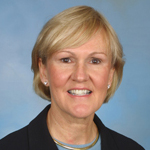$1.5M Grant Adds Pediatrics and Mentoring Component to SANE Program
The School of Nursing recognizes that equity demands dramatic shifts and has traditionally worked to address systemic challenges in health and education.

The School of Nursing recognizes that equity demands dramatic shifts and has traditionally worked to address systemic challenges in healthcare and education.
A recent $1.5-million grant from the U.S. Department of Health and Human Services’ Health Resources and Services Administration (HRSA) will enable Nursing Professor Dr. Kathleen Sekula to expand on the outcomes of a previous HRSA grant by adding a Pediatric Sexual Assault Nurse Examiner (SANE-P) program as well as a Mentoring program to the school’s Sexual Assault Nurse Examiners (SANE-A) Adult/Adolescent Program.
The four-phase pediatric program will provide education, clinical experience and telehealth monitoring to help prepare participants for the national certification exam. The mentoring program will support newly accredited SANEs as they move into the roles of preceptor and mentor in order to further increase the numbers of new SANEs.
A U.S. Department of Justice analysis of violent crime in 2016 found that nearly 80% of sexual assaults go unreported. The low number or total lack of SANEs in many areas across the country contributes to this alarming statistic. Sekula developed the nursing school’s program to address the critical need for trained and certified SANEs in rural and medically underserved areas throughout the United States.
Depending on the state, sexual assault victims are considered “pediatric” if they are age 14 and under. Pediatric cases can be complicated, according to Sekula, and victims must be assessed differently than adults.
“One of the differences with children is that they don’t usually present acutely—they are usually chronic assaults,” Sekula said. “When you’re interviewing a child, it’s a different approach, and there can be unique issues. For example, often it’s a family member who has been abusing the child, so you have to be careful with how you interact with and assess the family.”
Sekula said that other factors like injuries and evidence can be different in children and that the child’s developmental stage also plays a role. Of the eight expert nurses who work with Sekula on the HRSA grant, six are both SANE-A and SANE-P certified and will be involved in creating the pediatric program along with a forensic pediatrician specializing in child abuse cases.
In 2018, Sekula received a 3-year $1.47 million HRSA grant to design the SANE-A program to meet HRSA goals. Two-hundred thirty-one nurses from 22 states have enrolled in the program since its launch. Thirty-six nurses have completed the two years of preparation for and successfully passed the national SANE certification exam while the others continue to progress through the program. The current 3-year grant will expand on the success of the first grant. Students currently in the SANE Adult/Adolescent Program are eligible to participate in the pediatric program as well as the preceptor/mentor program.
Sekula said she and her team hope to have the Pediatric Didactic and the Mentoring programs ready by January 2022.
